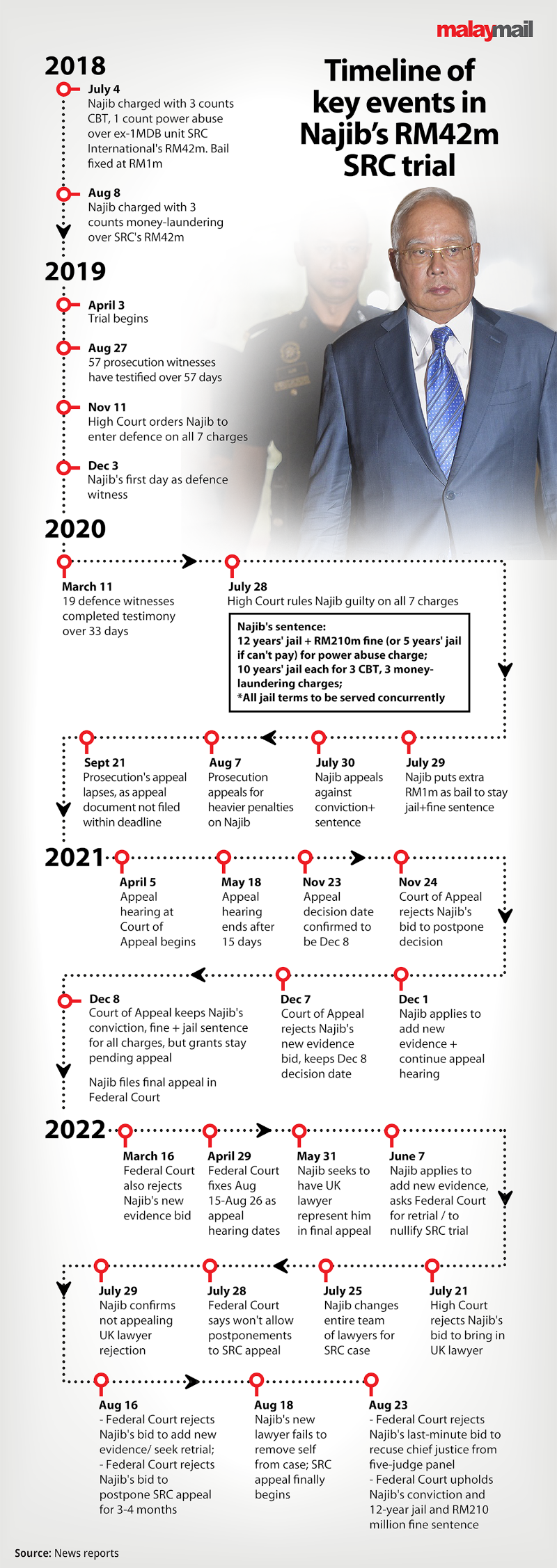KUALA LUMPUR, Aug 25 — Former prime minister Datuk Seri Najib Razak may not necessarily have to be in prison for 12 years, as ordered by the courts over the misappropriation of RM42 million from SRC International Sdn Bhd, lawyers have explained.
They said his imprisonment could be shortened due to prison rules governing prisoners who show good behaviour.
But the years that he must spend in prison could also increase, if he does not pay the hefty fine of RM210 million.
Najib has so far spent two nights in prison, after the Federal Court on Tuesday decided to maintain the 12-year jail sentence and RM210 million fine on him.
This means that if he does not pay the RM210 million fine, he should have to spend five more years in prison, on top of the 12 years.
But will Najib really have to spend 17 years in prison if he fails to pay the RM210 million? Here’s what several criminal lawyers told Malay Mail when contacted:

1. Automatic ‘add-on’ if fine unpaid
Senior criminal lawyer Datuk Geethan Ram Vincent said that convicted persons like Najib do not need to inform the courts that they are unable to pay a fine, as the extended jail time — for defaulting or not paying the fine — will automatically kick in.
“As to the fine, they need not go to court anymore. If they can pay, they pay fine and they therefore avoid the ‘in default imprisonment’,” he said.
“If he can’t pay, then he serves the additional five years. It no longer involves the courts. It’s an automatic process,” he added.
Geethan confirmed, however, that Najib does not need to pay the RM210 million fine by this week or even by this month.
He said that all Najib has to do to avoid having his jail time being extended by another five years is to pay the RM210 million fine before the end of his existing jail sentence. This is because the extra five-year jail time starts at the end of Najib’s current jail sentence.
Vivekananda Sukumaran, co-chair of the Bar Council’s Criminal Law Committee, also explained the additional five-year jail term does not kick in yet for Najib if the fine is not paid now.
“So when someone is given an imprisonment and fine, the failure to pay the fine will result in imprisonment that is over and above the existing prison sentence.
“He has time from the current 12-year sentence to pay, and by the end of it, he doesn’t pay the RM210 million, the five-year sentence will begin,” he said.

2. A discount for good behaviour: 11 years plus vs 17 years?
As a prisoner, Najib has a few options, including filing a review application to try and ask the Federal Court to set up a new panel of judges to hear his appeal against his conviction and jail and fine sentencing all over again.
Or he could seek for a royal pardon from the Yang di-Pertuan Agong or a state Ruler, depending on where he had committed the offence within Malaysia. The pardon request could be either rejected or granted, with lawyers saying that it could take months or even longer for an outcome.
Najib could also display good behaviour as a prisoner and hope to be considered for “remission” — which basically means a reduction of his jail sentence.
Citing the Prison Act 1995’s Section 44 and Regulation 43 of the Prisons Regulations 2000, Geethan explained that a prisoner will automatically be entitled to a standard one-third remission or reduction of their jail time for good behaviour.
He confirmed that prisoners do not have to apply for remission, as it would be an automatic consideration by the prison authorities.
Geethan said that Najib could end up only having to be in prison for 11 years and four months if he does not pay the fine (instead of 17 years), and laid out how the remission would hypothetically be calculated.
“For the 12 years, he will be entitled to 1/3 remission. So ideally, he only served eight years.
“At the end of eight years, if he still has not paid the fine, then his sentence of five years for in default begins. And yes, once again, he will be entitled to a 1/3 remission of the five years. So he serves 40 months.
“So all in all, if he doesn’t pay the fine, he will be serving eight years plus 40 months,” he said.

3. Here’s the full formula for the above
Former Malaysian Bar president Salim Bashir Bhaskaran referred to Section 283(1)(g) of the Criminal Procedure Code to explain when a convicted person has to pay up a fine to avoid their jail time from growing longer.
“The fine — as wording may appear in Section 283(1)(g) — can be paid within six years of length of imprisonment sentenced, but if imprisonment is longer than six years, it can be paid before expiration of the entire sentencing period ordered. Failure to pay fine will result in one being ordered to serve a default sentencing,” he said.
In other words, if a person is sentenced to jail for six years or less AND a fine, this prisoner can avoid having to serve the default jail term (or extra jail years) if he pays within the six years.
If a prisoner is sentenced to jail for more than six years (such as Najib’s 12 years) AND a fine, he has to pay the fine before the end of the existing jail term (before the end of 12 years in Najib’s case) to avoid spending even more time in jail, Salim confirmed. But if remission of sentence happens while the 12-year sentence is still being served midway by Najib, for example, he would have to pay the fine “before he ends the entire sentencing after remission”, Salim said.
Or in other words, since a one-third deduction would reduce the 12-year term to eight years, Najib would have to pay before the end of the eight years.
4. How do prisons decide whether to reduce jail time?
Salim explained why remission of jail term is available for prisoners showing good behaviour.
“Remission on sentencing is governed by prison regulations under Prison Act, the intent and purpose of remission is to encourage good conduct and restorative sentencing and justice, where a convict is entitled for one-third (four months) remission for every 12 months ordered to be spent in incarceration,” he said.
He explained that the calculation would mean four months is taken off for every year of jail time, which is then totalled up to be the number of months deducted from the entire jail term served by a prisoner.
Section 44 of the Prison Act states that prisoners who have jail sentences of more than one month “shall be entitled to be granted a remission of his sentence” with the aim of encouraging good conduct and industry and to facilitate reformative treatment.
As for the remission system in Malaysian prisons, Regulation 43 is the regulation that specifies the remission that prisoners are entitled to as “one-third” of their jail term. Lawyers told Malay Mail that the remission that can be given is exactly “one-third” as stated, and deductions will not be more or lesser than “one-third” of jail time.
Citing Regulation 43 which also refers to input or orders from the Pardons Board when the prison authorities decide whether a prisoner is entitled to remission, Salim said: “The discretions are exercised by prison authorities based on their evaluations and recommendations of the Pardons Board.”
He said the Pardons Board would consider a convict’s character, good conduct and the gravity of offences committed, and confirmed that the Pardons Board’s view would then be considered by the prison in deciding on whether to grant remission.
5. Can there be a refund of RM210 million if a royal pardon is given?
As for what would happen if Najib succeeds in obtaining a pardon, Geethan said it would not result in Najib getting back any money if he has paid for the fine.
“Firstly, it’s a pardon. It’s not the same as his appeal being allowed in court. He is purely being pardoned ie, forgiven for his misdeeds. In the circumstances, if fine was paid, it will not be returned.
“When pardoned he will be released from prison. He will no longer need to serve the complete prison term if pardoned,” he said when explaining that a pardon would only mean Najib need not serve the remaining sentence.























